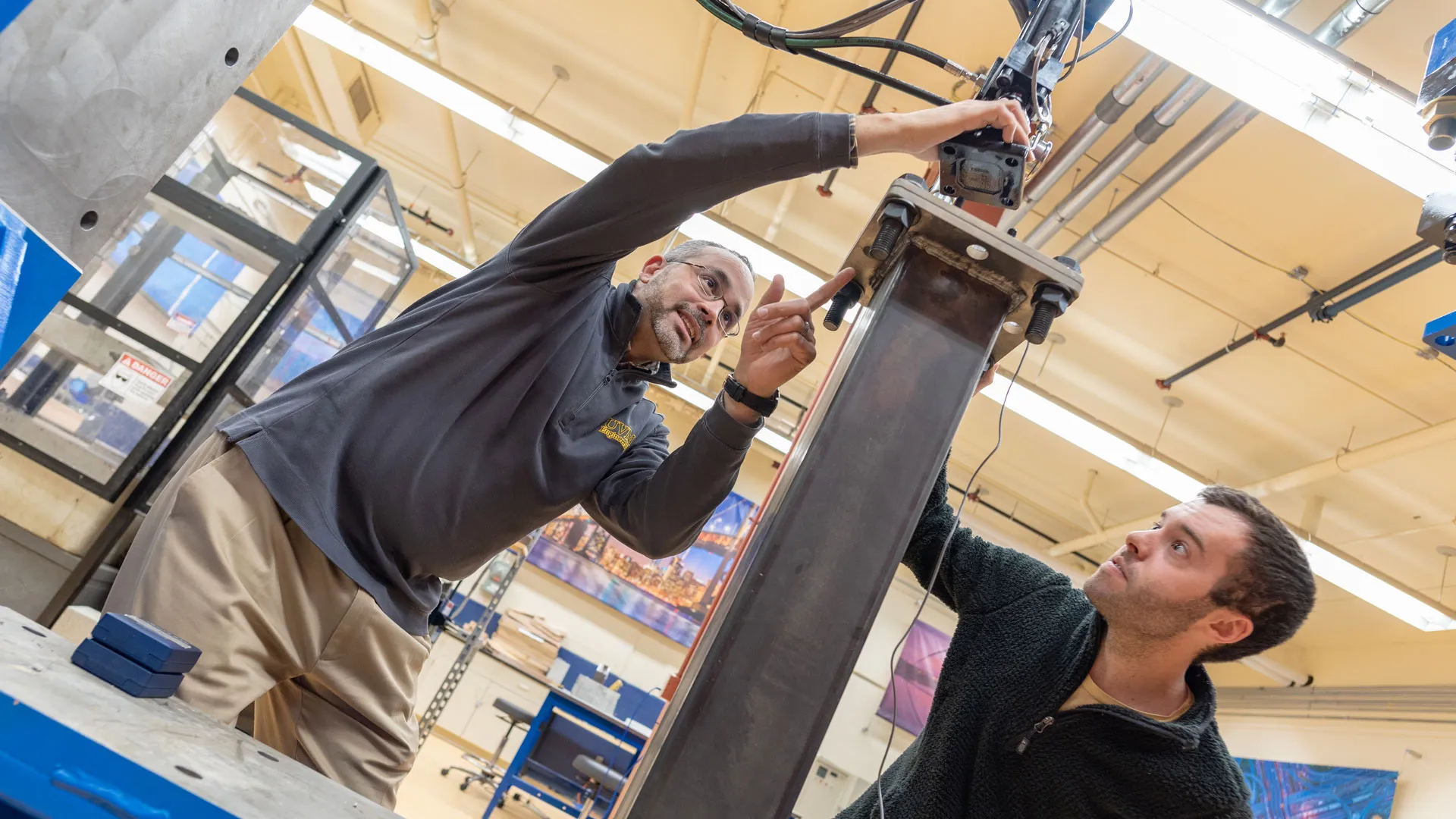Header
Graduate students bring a distinct perspective and set of knowledge to the College of Engineering and Mathematical Science. Our job as a research and world problem-solving institution is to expand the boundaries of a graduate student's experience, providing a personalized education rooted in collaboration and cross-pollination with supporting disciplines both within and outside the college.
UVM is a perfect-sized university. It offers wide areas of study, wide enough that you will never feel constrained, yet small enough that your advisor will have enough time to work with you. – Bijay K C - Civil and Environmental Engineering
SPOTLIGHT Graduate student profiles
Explore the research experiences of these graduate students from across the disciplines we offer:
Axel Masquelin - Biomedical Engineering
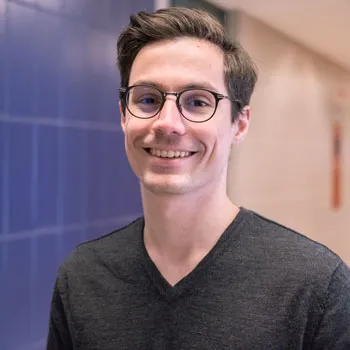
Area of study: Biomedical Engineering PhD
Faculty advisors: Dr. Jason Bates and Dr. Charles M. Kinsey
From: Indiana—the crossroads of America.
Why did you choose UVM? What do you like best about being at UVM?
I primarily chose UVM because of Dr. Jason Bates and Dr. Charles M. Kinsey. During my interview, I felt like I could easily work with both of them and that the opportunity they provided was right where I wanted to position myself for my career. At the moment, I love Vermont’s weather—but honestly, ask me that in a couple months and that answer might change.
Why did you choose this area of graduate study? What career will you pursue when you complete your degree?
I chose computational modeling and machine learning as I am fascinated by the potential these two areas have for the medical industry. I love the notion of personalized medicine but realize that as a society, we are currently very far from reaching that goal.
Tell us a little about the research or project you are working on.
I am working on using deep learning to be able to categorize lung nodules in CT images as being cancerous or non-cancerous. The project is still in its early phases and will evolve over time, so I recommend staying informed with all the great research going on at UVM’s Lung Center.
If you had a time machine and could go back to before you started your graduate program, what advice would you give yourself?
I’ve just recently started my Ph.D. program, so I don’t have that much advice. However, one “insight” that I may have is that you shouldn’t be afraid to look like a fool in front of your advisors. Advisors are here to guide you through your graduate career and provide feedback when necessary. If you don’t know something, don’t be afraid to ask questions. You should be genuine and authentic, if you don’t know something learn from your colleagues and mentors. There is no point in wasting 5 hours of research if someone could have corrected you and expedited the process. But that doesn’t mean that you should immediately seek help at the slightest difficulty—find the balance that lets you apply yourself.
Have you had an internship? If yes, where was it? What were your responsibilities? What were the highlights?
I interned with Eli Lilly and Company during the summer of 2017, which led to my getting a contract position while I applied to graduate school for the fall of 2017 and summer of 2018. During my stay at Eli Lilly, I became one of the lead experts on Hamilton Robotics automation system and had the opportunity to provide my feedback on certain projects and how to best optimize certain procedures in order to automate the process. Overall, the most rewarding feeling was getting offers from various automation companies because of how closely I worked with their representatives.
Ben LeBlanc - Civil and Environmental Engineering
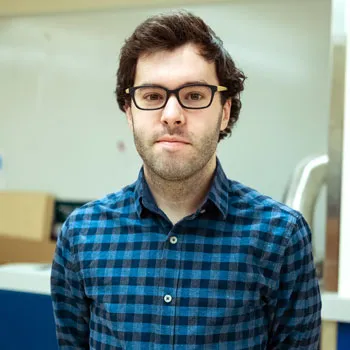
Area of study: Civil & Environmental Engineering: Structural Engineering/IGERT
Faculty advisor: Eric Hernandez
From: Saranac Lake, New York
Why did you choose UVM? What do you like best about being at UVM?
I chose UVM because I wanted to live in Vermont. I wanted to have the relaxed community atmosphere while conducting novel research. I like having the ability to conduct research during the day and hike, bike, or run in the morning and evening.
Why did you choose this area of graduate study? What career will you pursue when you complete your degree?
In undergrad I was a math, physics, and mechanical engineering major and very unsure of what I actually wanted to do. It wasn’t until my senior year that I became interested in bridges and civil structures. I then knew that I needed to go back to school to get a degree in civil engineering.
Tell us a little about the research or project you are working on.
My research project focuses on designing a fatigue monitoring and prognosis framework for structural and biomechanical systems. Essentially we want to be able to instrument a system so that we can monitor the stresses imparted on the system during its lifetime or a time period of interest in order to estimate its remaining useful life. The systems of interest are wind turbines, metal beams, and the human body. The most recent project I am working on is to monitor stress reactions in high mileage runners. By using an iPhone to measure accelerations and a model it is possible to estimate ground reaction forces while running. From these forces, we can estimate an equivalent stress felt by the tibia throughout a run. Ultimately we want to be able to determine the probability of a stress reaction during a training block to maximize performance and minimize overuse injuries.
If you had a time machine and could go back to before you started your graduate program, what advice would you give yourself?
The best advice I could give my past self is to not rush into graduate school right after undergrad. Before graduate school, I had applied to jobs without any luck but decided that I would just go back to school after taking only a semester off. I didn’t really know what I wanted to focus on for the next four/five years but it seemed like the best option at the time. Although I found the direction I wanted to pursue during my time at UVM, it still took a few years. By that point, I was in a multi-disciplinary program, which doesn’t necessarily let you focus on the research you are most passionate about because of its broadness. I believe that at an undergrad level it is fine to be in a multi-disciplinary program but I wouldn’t advise being in one at the Ph.D. level.
Have you had an internship? If yes, where was it? What were your responsibilities? What were the highlights?
During my second summer at UVM, I had an internship at the National Wind Technology Center in Boulder, Colorado. I worked with leading wind energy researchers on a project to determine if the reference frame that was used to model the properties of a 65-meter wind turbine blade would change the results from wind turbine simulations. They had a previous researcher work on this project who wasn’t able to finish it. Therefore I followed up on the work and found that there were convergence issues with the industry standard program when running wind turbine blades with different reference frames. Although the problem is still open ended I was able to find a bug in their code to help them make the program more robust.
Papers
LeBlanc, B., Hernandez, E.M. (2017). “Fatigue usage monitoring in wind turbines using sparse vibration measurements.” Proceedings of the International Workshop on Structural Health Monitoring, USA, 11, 2483-2490.
Bijay K C - Civil and Environmental Engineering
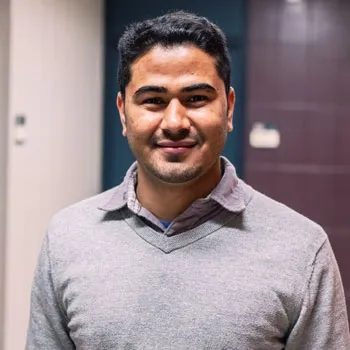
Area of study: Civil and Environmental Engineering, PhD
Faculty advisor: Dr. Ehsan Ghazanfari
From: Bhaktapur, Nepal
Why did you choose UVM? What do you like best about being at UVM?
The first reason is obviously its academic excellence. UVM is a well-reputed university. Moreover, UVM is a perfect sized university. It offers wide areas of study, wide enough that you will never feel constrained, yet small enough that your advisor will have enough time to work with you. UVM has all the resources that you can exploit to excel in your field. The faculty and staff at UVM work to make sure that you get all the possible help and resources to perform your research effectively. The second best thing about UVM is its location. Burlington is one of the best college towns in the country. There are so many things to do around UVM during free time. You can go to the Lake Champlain beaches, hike in the Green Mountains in the summer and ski during the winter.
Why did you choose this area of graduate study? What career will you pursue when you complete your degree?
During my undergraduate studies, I had no idea what to choose as my career. After I graduated, I started working for a consulting firm in Nepal. We performed a lot of site characterization, slope stability, soil and rock testing for the construction of roads and tunnels for hydropower. Geotechnical engineering never failed to amaze me. There was always something new that I would learn from each site I worked on. Once you start going deeper and deeper into the soil or rocks, you will keep on uncovering new facts. There is always something that amazes you in every site, which makes geotechnical engineering interesting. The deeper you go into it, the more interesting it becomes. This is why I chose geotechnical engineering as my area of graduate study. After graduating I plan to get a post-doc to expand my knowledge in the field, then I would like to go work for a research institution that works to develop bedrock, miles below us as a potential resource such as geothermal system, carbon capture and storage, or nuclear waste repository.
Tell us a little about the research or project you are working on.
Currently, in our lab at UVM, we are working on a geo-mechanical characterization of a rock specimen from a geothermal field at Nevada. We are also working to investigate how the coupled processes affect the fracture aperture and permeability evolution in an Enhanced Geothermal Systems. We are investigating the potential use of seismic signatures to monitor the condition of fracture aperture and permeability of a rock matrix in a geothermal system.
Can you share a time when a faculty advisor or mentor connected you with either new insights or a valuable opportunity (conference, publication etc.)?
Last summer, I was performing a test on a rock specimen from Blue Mountain Geothermal Area in Nevada. One day, my advisor (Dr. Ghazanfari) walked into the lab and talked to me about the American Geophysical Union conference. He asked me if I had any idea to present in the conference. I told him we should we present the current research we are performing in the conference. He said he had the same idea. Then, we applied for the presentation and we were selected to present at the conference. I will be going to Washington, D.C. this December to present at the conference, which I think is a great opportunity for me as a PhD student.
Papers
Kamali-Asl, A., K C, B., Foroutan, M., Ghazanfari, E., Cladouhos, T. T., & Stevens, M. (2019). “Stress-strain response and seismic signature analysis of phyllite reservoir rocks from Blue Mountain geothermal field.” Geothermics, 77, 204-223.
Kamali-Asl, A., K C, B., Ghazanfari, E., Hedayat, A. “Flow-induced alterations of seismic signatures and fracture aperture under constant state-of-stress in a single-fractured rock.” [Submitted to Geophysics in July 2018 (Under Review, Manuscript # GEO_2018_0574].
Pasha, M. F. K., Yeasmin, D., Zoldoski, D., K C, B. and Hernandez, J (2016). “Performance of a Biological Wastewater Treatment Plant for a Dairy Farm: Case Study” Journal of Environmental Engineering, 144(1), 04017086.
Lindsay Worley - Civil and Environmental Engineering
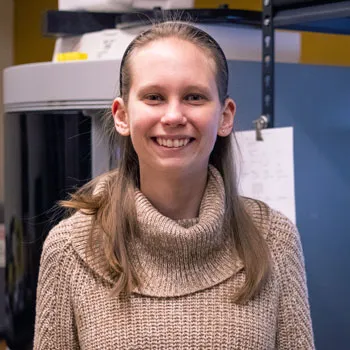
Area of study: Civil and Environmental Engineering, PhD
Faculty advisor: Mandar Dewoolkar and Donna Rizzo
From: Langhorne, Pennsylvania
Why did you choose UVM? What do you like best about being at UVM?
I chose UVM 10 years ago for my undergraduate degree when I fell in love with beautiful Lake Champlain and the Green Mountains. After a short hiatus in consulting, I came back to UVM for Graduate School for the same beauty but also for the great Professors and small attentive classes.
Why did you choose this area of graduate study? What career will you pursue when you complete your degree?
I choose Civil Engineering because I wanted to do work that would help the environment and the community. I hope to become a Professor after completing my Ph.D.
Tell us a little about the research or project you are working on.
I am part of the IGERT grant looking into the smart grid and I am hoping to combine my passion for hydrology and energy to form a thesis topic in the very near future.
Can you share a time when a faculty advisor or mentor connected you with either new insights or a valuable opportunity (conference, publication etc.)?
My advisors help me every day to reach my goal of becoming a professor by going over prospective research topics that will be marketable upon graduation. I have also attended the HydroVision conference over the summer to expand my knowledge on possible topics.
Have you had an internship? If yes, where was it? What were your responsibilities? What were the highlights?
During the summer of 2018, I had an internship at Oak Ridge National Laboratory in Oak Ridge, Tennessee as part of the IGERT grant. I worked in the hydropower department on the team concentrating on the Standard Modular Hydropower Project. It was great to experience working at a National Lab and exploring Tennessee for the summer.
David Rushing Dewhurst - Complex Systems and Data Science
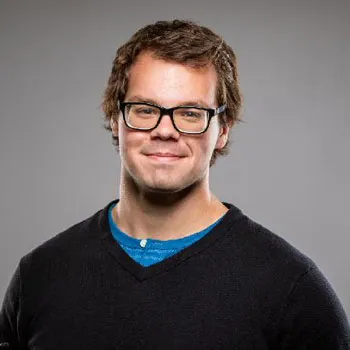
Area of study: Ph.D. Complex Systems and Data Science
Faculty advisor: Peter Dodds, Chris Danforth, Brian Tivnan
From: Massachusetts
Why did you choose UVM? What do you like best about being at UVM?
I actually was admitted to UVM as an undergraduate to study music performance—a little different from my current field of study, though not so different as one might suspect. I received my undergraduate degree (not in music performance!) and master’s of science at UVM and greatly enjoyed working with my advisors, so I decided to stay here for my Ph.D.
Why did you choose this area of graduate study? What career will you pursue when you complete your degree?
Data science draws together insights from many fields—physics, computer science, mathematics—and presents us with a nearly-universal set of tools with which we may study disparate phenomena. Upon graduation I will continue my career as a research scientist.
Tell us a little about the research or project you are working on.
I am mostly interested in stochastic processes and time series, with particular application to financial economics. Currently, I'm uncovering connections between a type of growth process and mechanistic generation of extreme values in asset return time series.
Can you share a time when a faculty advisor or mentor connected you with either new insights or a valuable opportunity (conference, publication etc.)?
I've been fortunate enough to have many of these experiences. To name a few: my advisor (and good friend), Peter Dodds, connected me with Brian Tivnan, who now serves as my co-advisor; Chris Danforth introduced me to the Mathematical Sciences Research Institute and helped me apply to one of their summer schools, to which I eventually went; and Brian Tivnan has connected me with several stellar career opportunities.
Have you had an internship? If yes, where was it? What were your responsibilities? What were the highlights?
I've had a few internships between undergraduate and graduate school put together. When I was an undergraduate at UVM, two of my majors were in economics and political science, so my internships were largely focused in that realm. I worked at the Massachusetts state house one summer, and subsequently worked in Washington for the Cato Institute and the Tax Foundations, where I studied and wrote on financial regulation and tax policy respectively. As a graduate student, I've been fortunate to work every summer with one of my advisors, Brian Tivnan, and two of my close friends and fellow graduate students, Colin Van Oort and John Ring IV, at the MITRE Corporation, a not-for-profit company that operates federally-funded research and development centers.
Papers
Dodds, Peter Sheridan, David Rushing Dewhurst, Fletcher F. Hazlehurst, Colin M. Van Oort, Lewis Mitchell, Andrew J. Reagan, Jake Ryland Williams, and Christopher M. Danforth. “Simon's fundamental rich-get-richer model entails a dominant first-mover advantage.” Physical Review E 95, no. 5 (2017): 052301.
Dewhurst, David Rushing, Christopher M. Danforth, and Peter Sheridan Dodds. “Continuum rich-get-richer processes: Mean field analysis with an application to firm size.” Physical Review E 97, no. 6 (2018): 062317.
Dewhurst, David Rushing. “Some results on a class of functional optimization problems.” arXiv preprint arXiv:1804.00087 (2018). (M.S. thesis, not published but elements of it form a paper in preparation)
Kristin McClure - Complex Systems and Data Science
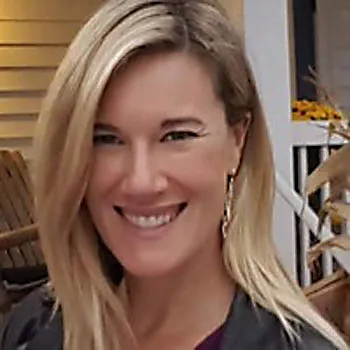
Area of study: Complex Systems and Data Science, Master’s Degree
Faculty advisors: Dr. Peter Dodds, Dr. Chris Danforth
From: South Burlington, Vermont.
Why did you choose UVM? What do you like best about being at UVM?
It really came down to two things for me: quality and culture. UVM’s Complex System and Data Science program is leading edge. The leadership team designed a program that blends the intersection of computer science, statistical insight, and communication in an outstanding and innovative manner. Based on the design of the program, I know I will acquire and master critical skills that will help solve small and large problems of our future. In addition to the quality of the program, the culture of the program is one of inclusiveness, high performance, and collaboration.
Why did you choose this area of graduate study? What career will you pursue when you complete your degree?
I started my career at IBM—applying the supply and demand principles to business applications. And as the supply chain matured, it evolved into a data rich environment. Mining the data, analyzing the data, observing patterns and trends, and being able to clearly and concisely tell a story from that data had power, and I knew that was what I wanted to do with my career. I wanted to tell stories from data that haven’t been told before. I wanted those stories to be precise and comprehensive and for those stories to improve lives and communities. With my experience and master’s degree in Data Science from UVM, my goal is to lead a data scientist team focused on improving our world for individuals and communities, while also improving the effectiveness of the organization that provides these services.
Tell us a little about the research or project you are working on.
My machine learning professor recently connected me with an exciting opportunity to partner with a senior member of the environmental engineering team. We are working together to develop a machine learning algorithm that can predict water quality. The applications would provide real-time feedback on water quality with the ability to guide water management practices, policies, and applications.
If you had a time machine and could go back to before you started your graduate program, what advice would you give yourself?
I came from industry and I think one of the most important things you can do for your career – whether it is in academia or industry, is to keep learning. And as such, I am really glad I took the leap to invest in my career with my studies at UVM for my masters. But it hasn’t always been an easy road! And if I had a time machine, I would tell myself the following:
1. Plan it out. I’m a planner by nature and prior to my program starting I met with my advisors and sketched out a path – based on my career goals and areas of interest. This has proven to be very valuable.
2. Math is not like riding a bike. If you are lucky, the high-level math will come back to you. But if you are like me, after doing years of basic math at work, it won’t. Brush up on it.
3. DO IT, if you love it, do it! I wish I’d started my program earlier!
Awards
I was awarded a patent for developing an inventory management system that optimizes inventory consumption while working for IBM.
Sage Hahn - Complex Systems and Data Science
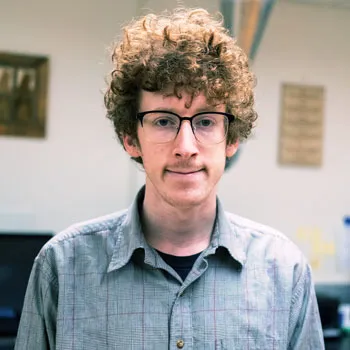
Area of study: MS Complex Systems and Data Science
Faculty advisor: Safwan Wshah
From: Concord, Massachusetts
Why did you choose UVM? What do you like best about being at UVM?
A big reason I chose to pursue a master’s at UVM after having completed my undergraduate here was because of the incredible connections I have made with faculty and other students. The various people I have met and continue to work with are by far my favorite part about UVM, in particular Alan Ling!
Why did you choose this area of graduate study? What career will you pursue when you complete your degree?
My undergraduate degree was in computer science, but I have always been a strong proponent for interdisciplinary study. The complex systems program offers a great mix of theory and practice, as well as exposure to a huge expanse of different ideas. While the prospect of choosing a career at this point in my life does not produce quite as much dread as it used to, I am very glad to still have a year or two to decide. That being said, I have recently grown very interested in the intersection between medicine and computer science.
Tell us a little about the research or project you are working on.
My main research project at the moment is in collaboration with the Vascular Surgery Program at the UVM Medical Center, working toward the automated detection of endoleaks. Endoleaks, of course, are perigraft blood flow outside the endograft post endovascular abdominal aortic aneurysm repair—which is just a lofty way of saying detecting little circles of contrast within bigger circles of contrast. I am also interested in the application of deep learning AI techniques on other medical imaging tasks, such as detecting spinal fractures, and am looking forward to engaging with new ones.
Can you share a time when a faculty advisor or mentor connected you with either new insights or a valuable opportunity (conference, publication etc.)?
A big shout out to Safwan Wshah here, who was responsible for both encouraging me to apply to graduate school and connecting me with everyone over at UVMMC who I am currently working with. I’m proud to be a member of his new research group Vermont AI Lab (VAIL), and greatly look forward to continuing to work with them.
Papers and Awards
I have not been published yet, but am submitting two papers to the IEEE International Symposium on Biomedical Imaging:
• “Automatic Deep Learning Based C2 Spinal Fracture Diagnosis”
• “Deep Learning for Detection of Endoleak after Endovascular Abdominal Aortic Aneurysm Repair”
I was also recognized by UVM as an Outstanding Computer Science Senior.
Shawn Beaulieu - Complex Systems and Data Science
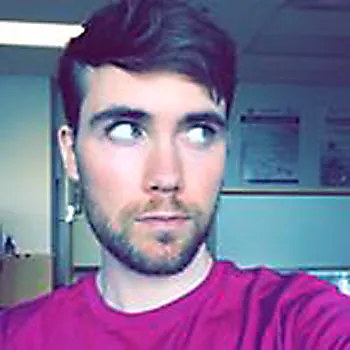
Area of study: Ph.D., Complex Systems
Faculty advisor: Nick Cheney
From: Colchester, Vermont
Why did you choose UVM? What do you like best about being at UVM?
The people I have the privilege of working with are what drew me here. Everyone here is incredibly patient and nurturing with their students, and very shrewd in their research. They’re powerfully driven, and derive real pleasure seeing one another succeed. It’s inspiring to see and take part it.
Why did you choose this area of graduate study? What career will you pursue when you complete your degree?
The program director, Dr. Peter Sheridan Dodds, likes to say that this field can be described as the “study of interesting things.” Complex systems encompass everything that emerges from the interactions of simple (if otherworldly) constituents that are, by themselves, unremarkable. This includes brains, language, robots, energy systems, markets, climate, and more—as well as their intersection. Or, more succinctly, it concerns everything we actually care about.
Tell us a little about the research or project you are working on.
I’m working to develop algorithms that move so-called artificial intelligence systems beyond the brittle and myopic simulacra of intelligence they currently are (which are ripe for abuse by governments and corporations) and toward the dynamic, self-actualizing creatures we see in nature.
If you had a time machine and could go back to before you started your graduate program, what advice would you give yourself?
Don’t be so hard on yourself. I’m reminded of the somewhat tawdry lyric by the band IDLES on their song “Television:” “If someone talked to you the way you do to you, I’d put their teeth through.” Also, get more sleep and make time to go outside.
Papers
My first paper, and the core of my master’s thesis, “Combating catastrophic forgetting with developmental compression,” was published earlier this year at the Genetic and Evolutionary Computation Conference (GECCO). It explored the ways in which Baldwinian evolution, an emergent process of Darwinian evolution under certain conditions, can discover robot controllers (i.e. neural networks) that are better able to avoid what’s called ‘catastrophic interference’—that is, competition between tasks such that improvements on one degrade performance in another—than controllers obtained by other means. This was published with my advisor at the time, Dr. Josh Bongard, and fellow Ph.D. student Sam Kriegman.
Sandhya Gopchandani - Computer Science
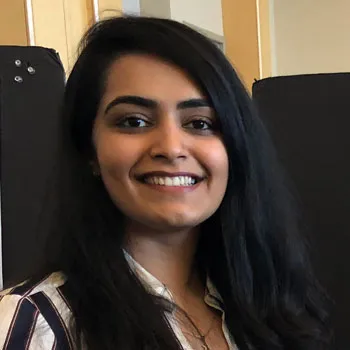
Area of study: Computer science (CS), master’s of science (MS)
Faculty advisor: Chris Danforth
From: Pakistan
Why did you choose UVM? What do you like best about being at UVM?
To be honest, I did not know much about Vermont before coming here but when I was doing my research for MS programs in the U.S., I really liked the research being done in the computer science and complex system departments. Moreover, I got full funding in the form of a GTAship. So, that strengthened my decision to come here.
Why did you choose this area of graduate study? What career will you pursue when you complete your degree?
I always see computer science as a medium to solve problems around me. It gives me the opportunity to be creative and helps me come up with actual solutions to real world problems. Also, CS has become a fundamental skill and can be applied to any other field.
Tell us a little about the research or project you are working on.
My current research revolves around social media and mental illness. We want to analyze social media and find clues and patterns about individual’s mental health from their behavior on social media. The research involves data science pipelines, neuro-linguistic programming (NLP) and machine learning (ML) techniques.
If you had a time machine and could go back to before you started your graduate program, what advice would you give yourself?
I would advise myself to reach out to people and make connections. Do not wait for others to initiate conversations. Something good happens when you go out of your comfort zone.
Can you share a time when a faculty advisor or mentor connected you with either new insights or a valuable opportunity (conference, publication etc.)?
Yes, there have been many times when I got to know about conferences and sessions happening both in the university and outside the university from my professors and peers. One of the conferences is Grace Hopper, which I learned about from my advisor last year. Moreover, I was asked to join lunch sessions with potential faculty to assess and provide my feedback. Such opportunities helped me share my opinions and learn from other experiences.
Have you had an internship? If yes, where was it? What were your responsibilities? What were the highlights?
Yes, I was a research and development summer intern at iManage at Chicago. I was working in a team responsible for bringing AI into its existing solutions. So, I had an opportunity to work with various innovative ML and NLP projects. My work involved getting data, preprocessing it and building ML models for tasks such as email classification and predicting high-risk employers. One interesting project that I worked on was to come up with minimum viable product to test the possibility of integrating continuous speech interface in its main product. So, I developed Alexa skills using Amazon open-source application programming interfaces (APIs) that communicated with its existing system. The company demoed this to multiple clients and the response was very positive. All three projects are currently in production or will be soon. The highlight of the internship was working on real projects with people who were very helpful and cooperative.
Awards
I was one of the 220 out of 6,000 people selected to participate in UGRAD academic cultural semester exchange program at University of Wisconsin Eau Claire in Fall 2014. The program was fully funded by the U.S. Federal Government to promote cultural exchange between the U.S. and Pakistan. Moreover, our final year undergraduate project won third place. The project included a mobile application and micro controller Arduino that would enable people with disabilities to operate their appliances using only their facial expressions.
Micah Botkin-Levy - Electrical Engineering
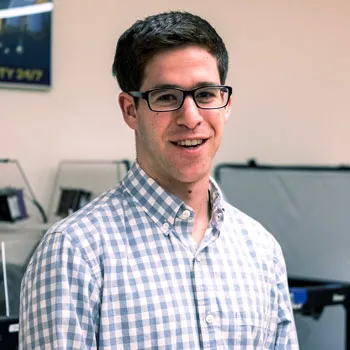
Area of study: MS Electrical Engineering
Faculty advisor: Mads Almassalkhi
From: Pelham, Massachusetts
Why did you choose UVM? What do you like best about being at UVM?
I already had good connections from my undergraduate program and my advisor has multiple grants for exciting research in my area of interest. Burlington is also an amazing place to live.
Why did you choose this area of graduate study? What career will you pursue when you complete your degree?
The masters program in electrical engineering will allow me to continue to grow my knowledge and experience in power systems and obtain new skills in the area of optimization and control systems. I plan on continuing to work in the energy grid sector once I finish my degree.
Tell us a little about the research or project you are working on.
Thesis Working Title: Distributed Optimal Control of Electric Vehicle Charging under Dynamic Grid Constraints
Abstract: As changing economics and global climate change concerns increase the adoption of renewables and electric vehicles, it is vital to study how best to integrate these in our existing energy systems. Plug-in electric vehicles (PEVs) are on track to quickly become a large factor in the energy grid. If left uncoordinated, the charging of PEVs will become a burden on the grid by increasing peak demand and overloading transformers. However, if the proper strategies and coordination is implemented, the problems will be mitigated without the need for expensive investments. A distributed control algorithm will be used to compute optimized charging schedules of a fleet of electric vehicles under multiple scenarios. Further work will compare optimized schedules against low-information packetized EV charging control schemes and will consider hardware in the loop validation to ensure practicality.
Can you share a time when a faculty advisor or mentor connected you with either new insights or a valuable opportunity (conference, publication etc.)?
My advisor met a colleague at a conference who works at a university lab in Germany (Karlsruhe Institute of Technology, or KIT). After discussing overlapping research interests, I was able to do a 6-week research internship at KIT this summer and apply one of the optimization algorithms they are working on to the problem I am studying. It was a great experience to work collaboratively with researchers in another part of the world.
Have you had an internship? If yes, where was it? What were your responsibilities? What were the highlights?
Yes, my most recent internship was with the Electric Power Research Institute in Palo Alto, California. My main task was to co-lead the development of a python tool called StorageVET, which is an open source energy storage evaluation tool. It was exciting to take a principle role in building an application that will have real-world implementations.
Sophie Gonet - Mathematics and Statistics
Area of study: Mathematics, PhD
Faculty advisor: Christelle Vincent
From: Stow, Massachusetts
Why did you choose UVM? What do you like best about being at UVM?
I heard great things about UVM and living in Vermont, in general. I love being surrounded by mountains. I also had a professor from undergrad who studied under Dr. Richard Foote for his Ph.D. I heard wonderful things about him and his experience here, so it was very enticing.
Why did you choose this area of graduate study? What career will you pursue when you complete your degree?
I love math—It is so pure and beautiful. I originally wanted to be an elementary math teacher, but as I advanced my math degree in undergrad, my love of math grew profoundly. I aspire to become a professor at a small liberal arts school.
Tell us a little about the research or project you are working on.
I am currently in the process of studying for the Real and Complex Analysis Ph.D. Qualifying exam. I just passed the algebra exam at the beginning of the month. I plan on taking the analysis exam in January.
If you had a time machine and could go back to before you started your graduate program, what advice would you give yourself?
I would tell myself that I can do it. It will be overwhelming at times, but I need to believe in myself. It also would be helpful to get ahead on some of the material before actually starting the program.
Can you share a time when a faculty advisor or mentor connected you with either new insights or a valuable opportunity (conference, publication etc.)?
Professor Foote has done this frequently. There were many times in his office when the light bulb would turn on and everything would suddenly make sense. He taught me the importance of drawing pictures. Sometimes a simple drawing makes all of the puzzle pieces fit together.
Mauricio Pereira - Mechanical Engineering
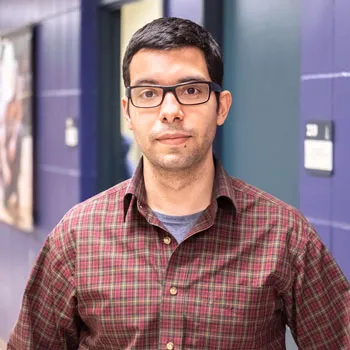
Area of study: Mechanical Engineering, Master’s of Science
Faculty advisor: Dryver Huston
From: São Carlos, São Paulo
Why did you choose UVM? What do you like best about being at UVM?
I was lucky enough to come to UVM as an exchange student on a Brazilian government scholarship. I really enjoyed that year here, both on personal and academic levels, so I decided to come back to UVM to pursue a higher degree in my field.
Why did you choose this area of graduate study? What career will you pursue when you complete your degree?
My bachelor’s degree is in mechanical engineering so that was a natural path to follow, but the underlying reason is that I enjoy working on projects that involve both hardware and software implementation—that requires me to learn new concepts and tools constantly, and the mechanical engineering field is so wide that I figured it would provide me with such opportunities. As for my future career, I will apply for Ph.D. programs in the fall and will hope for the best next year. If I am accepted I will follow that route, otherwise I will look for an industry position.
Tell us a little about the research or project you are working on.
The core of our research group right now is ground penetrating radar (GPR), a technology that enables us to see what is under the ground. Our group has applied this technology to detect underground utilities, for instance. My role in the group involves integration of GPR systems and Augmented Reality (AR) technology, either through smartphones or devices such as Microsoft’s HoloLens, to improve both localization and data visualization. Furthermore, I am also working on developing an image reconstruction algorithm to process radar data. With such an algorithm we can recover the scattering object shape from a multitude of radar signals. That has been a lot of fun for me since I knew very little of radar and AR before getting here!
If you had a time machine and could go back to before you started your graduate program, what advice would you give yourself?
Let yourself get involved in the project but don’t get lost in your “little world.” Communicate often, both with your advisors, other professors, and more experienced graduate students. This helps in many aspects, from expectation adjustment to project insights, better understanding of how the research world works and more.
Can you share a time when a faculty advisor or mentor connected you with either new insights or a valuable opportunity (conference, publication etc.)?
This has happened on multiple occasions to me, as I was lucky to have great orientation. I mostly work with professors Dryver Huston and Tian Xia, and there have been many cases where they provided insights on how to move on when I got stuck with my project, offered a different perspective on the problem, or let me know of valuable opportunities. To mention the most recent, professor Tian Xia is helping me organize papers we plan to submit to two conferences next year. I would have not known of such opportunities without his help.
Papers
We submitted two conference papers during my first year, we are hopefully submitting another two this coming month:
1) “3D Tomography for Multi-static GPR Subsurface Sensing,” presented at the SPIE Defense and Commercial Sensing 2018.
2) “New GPR System Integration with Augmented Reality Based Positioning,” presented at the ACM Great Lakes Symposium on VLSI



